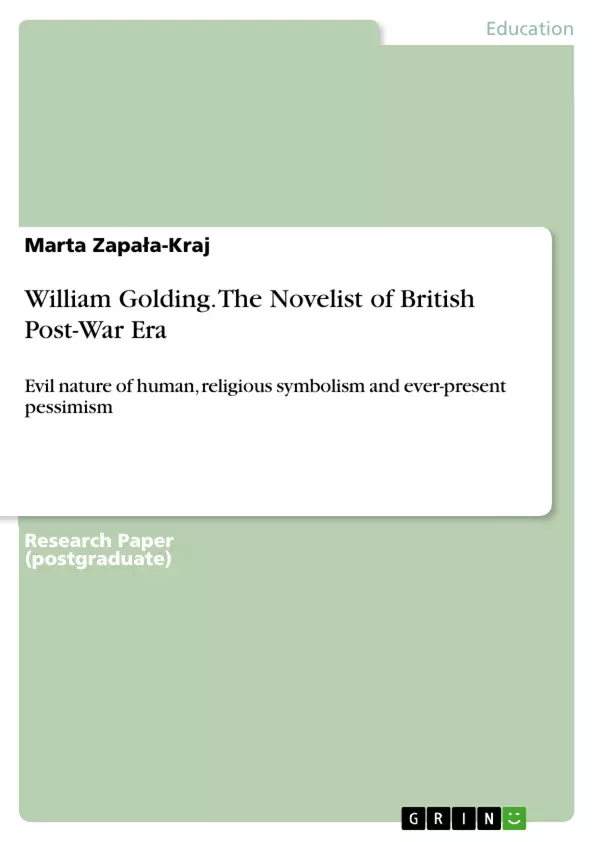The title of my project: William Golding - the Novelist of British Post-war Era allowed me to present one of the most imaginative writers of 1950’s of England from a several different perspectives. The decision behind choosing such topic was dictated by the previous interests which emerged as a result of my earlier contacts with the British culture.
Various British novelists and playwrights who emerged in the 1950’s expressed disaffection with the established socio-political order of their country. Their impatience and resentment were especially aroused by what they perceived as the hypocrisy of the upper and middle classes. They were called Angry Young Men - a journalistic catchphrase originally used by British newspapers after the success of the play Look Back in Anger by the playwright John Osborne.
Evil nature of human, religious symbolism and ever-present pessimism. Few novels as brief as William Golding’s Lord of the Flies raise so many fascinating questions. Are human beings evil and how does evil arise? What is the nature of isolation? Why and how do we choose our leaders and what are a leader’s responsibilities? The list could continue for several pages and still barely touch the peak of the mountain, yet each is a significant one worthy to be considerate.
Lord of the Flies, full of Christian imagery and symbolism, in the end has a very humanistic lesson - if the beast is within us we can cope with it. Rather than being under the influence of a supernatural devil – which in fact Golding claimed not to be the force present on the island - we are confronted with our own original sin and depravity. Once removed from the bounds and rules of civilization we have a strong tendency to revert to brutality and savagery. As Golding illustrates with Simon, though, there is goodness within people as well. If that goodness is reinforced, we have hope of overcoming the evil.
Table of Contents
- Introduction
- Chapter One - Cultural Background to British Literature of 1950's
- The Angry Young Men
- The New Theatre of the 1950's
- Chapter Two - William Golding – the Novelist of British Post-war Era
- Early Years
- The War and Its Impact on Golding's Writing
- After the War
- Golding's Early Works
- Later Works by Golding
- Chapter Three - William Golding's Symbolism
- Symbols and Their Meaning in Lord of the Flies
- Brutal Homo-sapiens vs. Gentle Neanderthals - The Inheritors
- Synthesis of Good and Evil - The Spire
Objectives and Key Themes
This project aims to present William Golding, a prominent English writer of the 1950s, from various perspectives. The focus is on understanding his writing in the context of the British post-war era.
- The cultural background of British literature in the 1950s, including the "Angry Young Men" movement and the emergence of a new theatre.
- William Golding's life and works, with particular attention to his experience during the war and its influence on his writing.
- The symbolism used by Golding in his novels, with a focus on "Lord of the Flies" and its exploration of the nature of good and evil.
- The influence of religious symbolism on Golding's works, specifically the concepts of original sin and the contrast between paganism and Christianity.
- The impact of Golding's works on the development of British literature.
Chapter Summaries
The first chapter examines the cultural background of British literature in the 1950s, focusing on the rise of the "Angry Young Men" movement, a group of writers and playwrights who expressed dissatisfaction with the established social and political order. It also discusses the transformation of the British theatre during this period, characterized by a move away from traditional plays and acting styles to more radical and challenging works.
Chapter two delves into the life and works of William Golding, exploring his early years, his experiences during the war, and its impact on his writing. It highlights how Golding's views on human nature were shaped by the conflict, leading him to challenge the traditional idea of inherent goodness. The chapter examines Golding's early works and his later works, including his most famous novel, "Lord of the Flies."
Chapter three focuses on the symbolism employed by Golding in his novels. It analyzes the symbolism in "Lord of the Flies," exploring how it portrays the complexities of human nature and the potential for both good and evil. It also examines the symbolism in "The Inheritors" and "The Spire," exploring how Golding uses religious symbolism to highlight the themes of original sin, the nature of evil, and the contrast between paganism and Christianity.
Keywords
The main keywords of this project are: William Golding, British Post-war Era, "Lord of the Flies", "The Inheritors", "The Spire", "Angry Young Men", British Literature, Symbolism, Religious Symbolism, Original Sin, Good and Evil, Human Nature, British Theatre, Post-war Culture.
- Quote paper
- MA Marta Zapała-Kraj (Author), 2018, William Golding. The Novelist of British Post-War Era, Munich, GRIN Verlag, https://www.hausarbeiten.de/document/470984


